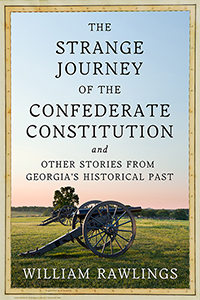 The Strange Journey of the Confederate Constitution and Other Stories from Georgia's Historical Past, William Rawlings, Mercer University Press, 288 pages, 2017, illustrations, maps, bibliographic notes, bibliography, appendix, index, $29.00.
The Strange Journey of the Confederate Constitution and Other Stories from Georgia's Historical Past, William Rawlings, Mercer University Press, 288 pages, 2017, illustrations, maps, bibliographic notes, bibliography, appendix, index, $29.00.William Rawlings offers a clear and concise collection of essays organized as themes in Georgia history: the cotton gin's actual history, land frauds in colonial and revolutionary era Georgia, the creation and post-war travels of the Confederate States' constitution, what exactly the Confederate gold was and how it was spent and not buried, the creation of the Stone Mountain Memorial [and what was supposed to be but is not on it], and the first, second and third Ku Klux Klans.Also murder trials, fraud trials, and a pastor who shoots a blue jay bird and a chicken.
Rawlings offers an extensive appendix entitled: Exploring Our Past: A Short Practical Guide to Historical Research for Writers which is suitable for aspiring writers, Advanced Placement History students, college graduates and journalists. Overall, Rawling's The Strange Journey of the Confederate Constitution and Other Stories for Georgia's Historical Past is a superb example of well writing, interesting and insightful state and local history with applications to the nation's story.
From the Publisher: The Strange Journey of the Confederate Constitution and Other Stories f\rom Georgia's Historical Past is a collection of seventeen articles and essays on topics in Georgia and Southern history. Individual chapters are arranged by era and cover subjects ranging from The Great Yazoo Fraud of the 1790s, to Jefferson Davis and the Confederate Treasure of the 1860s, to the Reign of Terror visited by the Ku Klux Klan in Macon of the 1920s. While academic, the book’s varying topics are aimed at readers with a general interest in the intriguing and often convoluted history of the South. Some articles focus on events, others on people (e.g. Gutzon Borglum or Eli Whitney), and still others on more controversial topics, such as the place of The Birth of a Nation and Gone With the Wind in modern society. The author’s writing style is one that promotes relaxed recreational reading, treating each topic as an unfolding story as the chapter progresses. As a bonus to those interested in research and writing about historical subjects, the Appendix contains advice in the form of “A Short Practical Guide to Historical Research for Writers.”
No comments:
Post a Comment